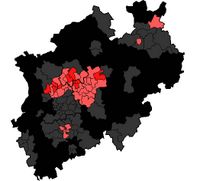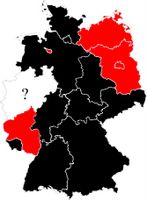The Blogosphere At Frankfurter Rundschau
Tuesday, May 31, 2005Frankfurter Rundschau online
 We were at the doctor's today. My wife is in her 21st week and it was time for a ultrasound checkup. We asked the gynecologist to keep the answer to the big question to herself, as we chose not to spoil the fun with the search for male and female names, so she didn't show us - but my wife thinks it's a girl. What you can see on the picture is the head, torso, right leg and a part of the umbilical cord. The doctor wanted to take the picture when it's looking into our direction, but the kid ignored us. We could watch the picture being projected on the ceiling, but it was difficult to tell how big it is. The doctor measured the body, it's 21 cm now (that's 8.26 inch for the people not blessed with the metric system) and kicking and moving like there's a party going on and everybody's invited. My wife doesn't feel anything yet, but that'll change soon. I can't wait for 9th October, but I hope the baby takes all time it needs in there.
We were at the doctor's today. My wife is in her 21st week and it was time for a ultrasound checkup. We asked the gynecologist to keep the answer to the big question to herself, as we chose not to spoil the fun with the search for male and female names, so she didn't show us - but my wife thinks it's a girl. What you can see on the picture is the head, torso, right leg and a part of the umbilical cord. The doctor wanted to take the picture when it's looking into our direction, but the kid ignored us. We could watch the picture being projected on the ceiling, but it was difficult to tell how big it is. The doctor measured the body, it's 21 cm now (that's 8.26 inch for the people not blessed with the metric system) and kicking and moving like there's a party going on and everybody's invited. My wife doesn't feel anything yet, but that'll change soon. I can't wait for 9th October, but I hope the baby takes all time it needs in there.
It's not a big surprise that we want to go into the campaign with Mrs Merkel as our candidate, the leaders of the CDU/CSU (Christian Social Union) will hold a joint session later this day. The CDU doesn't have a manifesto for the election, so they're under pressure to pass many internal compromises (between CDU and CSU). This might lead to new quarrels and weaken the opposition. As I wrote yesterday, Schröder has no alternative - beside that he seems to be convinced that against a candidate like Mrs Merkel, in direct comparison, he might have a better chance (49% vs 21%). Also, German magazine Stern reports that Lower Saxony Prime Minister Christian Wulff would be a more promising candidate than Angela Merkel. Yet, Mr. Wulff said "No" when asked whether he'd like to run for office, but that could change quickly, if the prospects are good enough.
Diet election on 22.05.2005 | ||
| number | % | |
| eligible voters | 13 239 170 | 100,0 |
| voters | 8 334 561 | 63,0 |
| invalid votes | 91 189 | 1,1 |
| valid votes | 8 243 372 | 100,0 |
| therefrom | ||
| SPD | 3 059 074 | 37,1 |
| CDU | 3 695 806 | 44,8 |
| FDP | 508 354 | 6,2 |
| Green | 509 219 | 6,2 |
| REP | 67 282 | 0,8 |
| PDS | 72 982 | 0,9 |
Diet election on 14.05.2000 | ||
| number | % | |
| eligible voters | 13 061 265 | 100,0 |
| voters | 7 409 399 | 56,7 |
| invalid votes | 72 988 | 1,0 |
| valid votes | 7 336 411 | 100,0 |
| therefrom | ||
| SPD | 3 143 179 | 42,8 |
| CDU | 2 712 176 | 37,0 |
| FDP | 721 558 | 9,8 |
| Green | 518 295 | 7,1 |
| REP | 83 296 | 1,1 |
| PDS | 79 934 | 1,1 |
 Last update for today. As you can see, the major constituencies for the SPD were in the Ruhr Area, a metropolitan area (actually the most dense population area in Europe) and still the SPD stronghold in NRW. The rest of the state chose CDU this time, but it will probably take the SPD longer than the coming legislative period to retake it.
Last update for today. As you can see, the major constituencies for the SPD were in the Ruhr Area, a metropolitan area (actually the most dense population area in Europe) and still the SPD stronghold in NRW. The rest of the state chose CDU this time, but it will probably take the SPD longer than the coming legislative period to retake it.Chancellor Schröder's strategy to advance the national election is somewhere between ingeniousness and harakiri.I think it's the former not only because there's simply no alternative: Since it will be harder to run the country, the government would go down in flames and slowly lacerate itself - a political stalemate is the worst that can happen to any government. Also, Chancellor Schröder challenges the opposition, they have to act now and show that they're fit for government. First they'll have to agree on one candidate: Germany might elect its first female Chancellor (Mrs. Angela Merkel) this fall, but there's still the possibility that one of her rivals tries to take over (as happened before the last national election). Another side effect is that people won't be talking long about the election in NRW and more about the upcoming national one. A risky move, but the SPD is cornered.
updated extrapolation:"Initiative for more economic growth and reduction of bureaucracy:
- rejection of anti-discrimination law and against "Green" gene technology
- 1:1 conversion of federal and EU laws
- elimination of SPD-Green "commissary inflation"
Also, the CDU wants to initiate a law against heads scarfs by teachers in public schools and several laws in regard to universities and school education. The CDU also plans to support start-up enterprises by lowering legal obstacles and increase Public-Private-Partnerships. Another main point is the creation of 1,000 new traineeships (elderly nursing). They also plan to improve several laws for child care, re-introduce equestrian police squads, increase controls against graffiti (how is not clear though) and grow 100 avenues in NRW."
 What's happening next? The CDU will form a coalition with the FDP, we'll how they'll try to solve problems like unemployment in NRW. For poor students, it'll become more difficult to study at all, the CDU already announced to easen dismissal protection - read their program for the first 200 days here.
What's happening next? The CDU will form a coalition with the FDP, we'll how they'll try to solve problems like unemployment in NRW. For poor students, it'll become more difficult to study at all, the CDU already announced to easen dismissal protection - read their program for the first 200 days here.A big surprise: The SPD or more exactly, Mr. Müntefering, the SPD's chairman, thinks about advancing the national election to this year's fall. Since they just lost the election in NRW, this is really a blowoff. Chancellor Schröder is fighting back."We knew the surveys were good, we mobilized our voters, 10,000 people alone in the NRW team, the halls were full, the seats were full, the Red-Green government has to go. And therefore I thank everybody, everybody at home and here in our branch office.
I know that the voters put confidence in us, gave us a mandate that NRW comes back, in the following five years with a coalition of the middle. To create security, for the unemployed, for the ones who are afraid to loose their work, for the women to help them to combine work and family - our policy will make NRW a state of a new chance. [...] If we continue to fight as we did in the past weeks, I'm confident we will suceed."
 NRW (North Rhine-Westphalia), Germany's most populated state with its 18 million citizens is going to the ballots today. The election is - almost - exiting - since the SPD (Social Democratic Party of Germany) ruled for 39 years with the CDU (Christian Democracic Union of Germany) in the opposition. Since 2002, the federal government is lead by Peer Steinbrück (SPD) who formed a coalition with the Green Party (Alliance '90/The Greens). The Green's website features a Star Wars-related campaign video, the SDP is fighting to the end as well. Balloting is over at 6 p.m., then you can watch the results coming in here, it's one of the offical sources provided by the government.
NRW (North Rhine-Westphalia), Germany's most populated state with its 18 million citizens is going to the ballots today. The election is - almost - exiting - since the SPD (Social Democratic Party of Germany) ruled for 39 years with the CDU (Christian Democracic Union of Germany) in the opposition. Since 2002, the federal government is lead by Peer Steinbrück (SPD) who formed a coalition with the Green Party (Alliance '90/The Greens). The Green's website features a Star Wars-related campaign video, the SDP is fighting to the end as well. Balloting is over at 6 p.m., then you can watch the results coming in here, it's one of the offical sources provided by the government.  Once a year, the Japanese community in Düsseldorf organizes a second hand market between main station and the VHS (a public adult education institute) in early May. This time, it was smaller than in the years before. We got a Doraemon puzzle for a friend. If you're living in the area and want to buy all kinds of stuff cheap, take a look at Duesselnet. You'll need somebody who translates Japanese for you, though. Over 5,000 Japanese live in Düsseldorf, in Europe, it's the biggest Japanese community. The Sarariman are sent here to work for four or five years, and usually they come with their families. When their time has come, they sell their belongings before returning home to Japan, and lots of it is on Duesselnet's black board or the one in the Japanese club at Marienstrasse.
Once a year, the Japanese community in Düsseldorf organizes a second hand market between main station and the VHS (a public adult education institute) in early May. This time, it was smaller than in the years before. We got a Doraemon puzzle for a friend. If you're living in the area and want to buy all kinds of stuff cheap, take a look at Duesselnet. You'll need somebody who translates Japanese for you, though. Over 5,000 Japanese live in Düsseldorf, in Europe, it's the biggest Japanese community. The Sarariman are sent here to work for four or five years, and usually they come with their families. When their time has come, they sell their belongings before returning home to Japan, and lots of it is on Duesselnet's black board or the one in the Japanese club at Marienstrasse.
 My family doesn't really know what my (south-korean) wife and me eat. My brother is married to a German, my mother is with an American, my father is married with a Croatian - diversity whereever you look, even on our dishes. My wife's family in Korea is curious, too, so I'll post food every now and then. Today we had spring rolls, whic are not very difficult to cook, but I need more practice with the rolling - I did the ugly roll in the back.
My family doesn't really know what my (south-korean) wife and me eat. My brother is married to a German, my mother is with an American, my father is married with a Croatian - diversity whereever you look, even on our dishes. My wife's family in Korea is curious, too, so I'll post food every now and then. Today we had spring rolls, whic are not very difficult to cook, but I need more practice with the rolling - I did the ugly roll in the back.
 In the following months, I would like to introduce you to a few interesting people. Some of them I had the pleasure to meet in person, and a few others, although not very high-profile, deserve their five minutes of publicity.
In the following months, I would like to introduce you to a few interesting people. Some of them I had the pleasure to meet in person, and a few others, although not very high-profile, deserve their five minutes of publicity. I read estimations a few months back that Germany would need three million immigrants each year to stop the population aging. No politician will be able to explain such an influx. I'll probably be alive in the next 50 years - I'm curious how nations will deal with Mr Chamie's prognosis.CHAMIE: Well population change is very simple. There are only three ingredients: mortality, fertility and migration. And…ah…for most countries, migration is relatively secondary for most countries. So it’s fertility and mortality. With low mortality the real engine is fertility and that’s what accounts for these differences. And they’re very…
JENKINS: Fewer women having fewer babies? That’s the bottom line is it?.
CHAMIE: Exactly. Lower birth rates, the lower replacement explains why we would be going three hundred years back to two point three billion.
[...]
CHAMIE: They’re many reasons bringing down fertility. One, of course, is mortality rates have come down; that’s a pre-condition – you have to have mortality rates coming down. Second, people are moving to cities, life is changing, children are not as needed as they were on farms and agricultural work. Third, women are becoming educated – once they become educated, they join the labor force – they are delaying marriage, they’re delaying their first birth. Tastes have changed. Now all those ingredients put together – and effective contraception to boot – means that people are choosing smaller families because that’s what they want – and we’re seeing this globally.
[...]
CHAMIE: Well, our projection indicates that India will add another half billion people – five hundred million people - over the next fifty years.
JENKINS: That’s a large growth…
CHAMIE: Pakistan over the next fifty years – despite the fact that Pakistan now is a hundred and fifty-five million and China is one point three billion - over the next fifty years Pakistan will add more people than China. O.K.? Pakistan will move up the list and become the...our projections indicate the fourth largest country in the world
[...]
CHAMIE: By mid century the population of Iran will overtake Russia’s. The population of Palestinians would be larger than the Israelis, the population of the Moroccans would be larger than the Spaniards. The population of the Philippines would be bigger than Japan.
[...]
JENKINS: There are countries I believe, like Italy and South Korea that are already trying to encourage women to have more babies as a way of addressing this problem. Am I right, and if so, have they had any success?
CHAMIE: They’ve had pro-natalist policies and trying to raise it, but so far, they have not been able to raise it back to replacement and most demographers do not believe that they will be able to get it back to replacement in the near future. And the reason why is that people choose according to their own interests and most women are saying, I will have one, possibly two but we are not going to three, four and five simply because we don’t have the time, we are working and we need more help if we’re going to have this and there’s no help coming.
 One of Germany's best newspapers, "Die Zeit" appearently started blogging about different topics, you can take a look their blogindex here. I accidently stumbled over Elternzeit, a blog by Matthias Braun about children, getting children, becoming parents and all that. It's fairly new, too, the first entry was posted in early March.
One of Germany's best newspapers, "Die Zeit" appearently started blogging about different topics, you can take a look their blogindex here. I accidently stumbled over Elternzeit, a blog by Matthias Braun about children, getting children, becoming parents and all that. It's fairly new, too, the first entry was posted in early March.When I was very young, I thought my father knew everything. Indeed, Omni magazine once declared him "The smartest man in the world". Upon hearing this, his mother exclaimed,"If Richard is the smartest man in the world, God help the world!" My father was the first one to laugh.
I was blinded by a terrific silver-white flash — I had to look away. Wherever I looked an enormous purple splotch appeared: it was just as bright when I closed my eyes. "That," said my scientific brain to my befuddled one, "is an after-image caused by looking at a bright light — it is not the bomb you are looking at." So I turned back to look at the bomb.
The sky was lit up with a bright yellow light — the earth appeared white. The yellow gradually became darker, turning gradually to orange. In the sky I saw white clouds from above the gadget caused by the sudden expansion following the blast wave — the expansion cools the air and fog clouds form — we had expected this. The orange got deeper, but where the gadget was, it was still bright, a bright orange, flaming ball-like mass. This started to rise, leaving a column of smoke behind, below looking much like the stem of a mushroom. The orange mass continued to rise, the orange to fade and flicker. A great ball of smoke and flame three miles across it was, like a great oil fire billowing and churning, now black smoke, now orange flame. Soon the orange died out and only churning smoke, but this was enveloped in a wonderful purple glow.
Another after-image I thought, but on closing my eyes it did disappear, and appeared on opening them again. Others said they saw it too, probably caused by ionised air produced in the great heat. Gradually this disappeared, the ball of smoke rising majestically slowly upward, leaving a trail of dust and smoke.
Then suddenly there was a sharp loud crack followed by resounding thunder. "What was that?" cried the man at my left, a war department representative. "That is the thing," I yelled back.
 Today is Europe Day!
Today is Europe Day!The ideas behind what is now the European Union were first put forward in Paris on 9 May 1950, against the background of the instability and the need to rebuild a shattered Europe. The then French Foreign Minister Robert Schuman read to the international press a declaration calling on France, Germany and other European countries to pool together their coal and steel production.
What he proposed was the creation of a supranational European Institution, charged with the management of the coal and steel industry, the basis of all military power. The countries which he called upon had almost destroyed each other in a dreadful conflict, and Schuman's proposal to remove coal and steel production from national controls would make sure such a war could never happen again.
Today's ambition is completely different: to build a Europe which respects freedom and the identity of all of the people who live on this continent. But this ambition is only possible because of the foundations laid by Schuman's declaration
That is why during the Milan Summit of EU leaders in 1985 it was decided that 9 May should be celebrated as "Europe Day".
 Japan could go nuclear within a short period of time if it wanted: they have the technology, the money and the ressources. That was true already for decades, but the Japanese government was missing the will, determination and several factors lead even to a rejection of an offer by the United States (read below) and led finally to the ratification of the Nuclear Non-proliferation Treaty in 1976.
Japan could go nuclear within a short period of time if it wanted: they have the technology, the money and the ressources. That was true already for decades, but the Japanese government was missing the will, determination and several factors lead even to a rejection of an offer by the United States (read below) and led finally to the ratification of the Nuclear Non-proliferation Treaty in 1976. "The declaration on Thursday warns that Japan's plan to separate and stockpile up to eight metric tons of plutonium annually, enough to make 1,000 nuclear bombs, calls into question Japan's commitment to strengthening the NPT. [...]
With Rokkasho operational, by 2020 Japan's domestic stock of plutonium could equal the U.S. stockpile of plutonium for weapons," said Frank von Hippel, physicist and professor at the Science and Global Security Programme at the U.S.-based Princeton University.
Anti-nuclear lobbyists are worried that the safeguards at Rokkasho would be inadequate to prevent the deliberate diversion or theft of large quantities of plutonium.
"Separated plutonium poses a risk of theft, and such large stocks would be destabilising," Von Hippel said in the report.
"if Japan wishes, the U.S. ist prepared to provide Japan nuclear warheads or the know-how to manufacture nuclear warheads." (source: Japan's Nuclear Future: The Plutonium Debate and East Asian Security, 1996)
"I think it will be a safer world and a better world if we have a strong, healthy United States, Europe, Soviet Union, China, Japan, each balancing the other, not playing one against the other, an even balance."
An authoritative study concluded in 1966 that it would be "highly unthinkable" for the United States to risk a nuclear exchange with Russia or China for the sake of Japan. The Communist powers could use Japan as a hostage to deter and American attack, the study said, and there would be "little practicle meaning" in the destruction of Communist cities after "Tokyo and Osaka had been turned into a second Hiroshima and Nagasaki."
 On my way to Hamburg, the driver's girlfriend was from Iran, her name was Layla. I was curious and asked her what she thought about her home country. Layla came to Germany when she was 11 years old, so she has an insight in both cultures. Last year, there was a lively debate about a German school teacher who refused to take off her head-scarf (Hijab) during lessons in a public school. The school argued that the scarf was a symbol of cultural discrimination and thus also a political symbol and therefore couldn't be worn in the school. Laizism demands the separation of church and state, but there are also the questions whether the scarf is actually a symbol at all (Muslims in Germany argued that it isn't) and there's also the basic right of free exercise of religion. The Federal Constitutional Court left the decision to the jurisdiction of each federal state, also the court didn't percieve the question of the scarf being a political sign or not as relevant.
On my way to Hamburg, the driver's girlfriend was from Iran, her name was Layla. I was curious and asked her what she thought about her home country. Layla came to Germany when she was 11 years old, so she has an insight in both cultures. Last year, there was a lively debate about a German school teacher who refused to take off her head-scarf (Hijab) during lessons in a public school. The school argued that the scarf was a symbol of cultural discrimination and thus also a political symbol and therefore couldn't be worn in the school. Laizism demands the separation of church and state, but there are also the questions whether the scarf is actually a symbol at all (Muslims in Germany argued that it isn't) and there's also the basic right of free exercise of religion. The Federal Constitutional Court left the decision to the jurisdiction of each federal state, also the court didn't percieve the question of the scarf being a political sign or not as relevant. Space shuttles have been in service since the late 70ies. Now, Lockheed Martin presented a the successor, the Crew Exploration Vehicle. The bad news is, the plans are get it in the air around 2014, which is much longer than the Apollo program i.e. needed. Certainly, after the tragic loss Challenger and Columbia safety is written with a capital S, but the space shuttle won't presumably be in the air after 2010, so there's four years without an adequate transport vehicle. The CEV is supposed to offer flexibilty, safety, (partial) reusabilty and affordability - the two latter were already aims set forth in the space shuttle program, but the space shuttle fleets maintenance and individual flights alone were up to 50 times more expensive than intially planned, furthermore the reusabilty aspect was never properly met, too many parts had to be repaired after each flight.
Space shuttles have been in service since the late 70ies. Now, Lockheed Martin presented a the successor, the Crew Exploration Vehicle. The bad news is, the plans are get it in the air around 2014, which is much longer than the Apollo program i.e. needed. Certainly, after the tragic loss Challenger and Columbia safety is written with a capital S, but the space shuttle won't presumably be in the air after 2010, so there's four years without an adequate transport vehicle. The CEV is supposed to offer flexibilty, safety, (partial) reusabilty and affordability - the two latter were already aims set forth in the space shuttle program, but the space shuttle fleets maintenance and individual flights alone were up to 50 times more expensive than intially planned, furthermore the reusabilty aspect was never properly met, too many parts had to be repaired after each flight. Yesterday, two men who helped renegade General Gotovina on the run by supplying him with fake passports were arrested.
Yesterday, two men who helped renegade General Gotovina on the run by supplying him with fake passports were arrested.